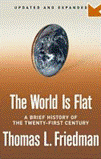










|
2007 May 16 
Copyright © Brian Wright
The Coffee Coaster™
The World is Flat
A brief history of the
21st century
by Thomas L. Friedman
2005, Farrar, Straus and Giroux, 469 pages
We tend to think of global trade and economics as something driven by the IMF, the G8, the World Bank, the World Trade
Organization (WTO), and the trade treaties forged by trade ministers. I don't want to suggest that these governmental agencies are irrelevant.... But they are going to become less important.—page 183
This Friedman book was a number one bestseller on the NY Times list (May 2005), and as the foreign affairs columnist for the Times, he has a lot of intellectual-literary street credit. As shown from the above quote, his analysis of globalization shows a willingness to think outside conventional boxes.[1]
However, Friedman glosses over far too many facts of reality, both in the context of global corporatism and in the area of Middle East policy—he's fundamentally a Zionist and an apologist for the Neoconistas and Pax Americana—to be considered any useful friend of liberty or humanity.
Aside from that caveat, Friedman takes correct positions on environmental science and oil-junta malignancy, with at least practical reservations about American empire. The book mainly outlines the complex forces, both market and Cartel-induced, that have led to the interconnected planet we share today.
He begins by listing 10 major "flatteners," from the fall of Communism to offshoring and proliferation of a worldwide
net of fiber-optic cabling... the latter being a legacy of the dot.com boom of the 90s. Certainly, the Internet explosion is a flattener, which Mr. Friedman summarizes in a description of Netscape going public (8/9/1995).
The book is voluminous, filled with many illustrative and entertaining anecdotes of how business is conducted today in an inconspicuously revolutionary manner. For those of us immersed in this world, which Alvin Toffler largely foretold in Future Shock (1970), not much astounds us. Still I must say, for example, I have never had the party line on Wal-Mart's success story so smoothly delivered.
That whole supply-chain innovation segment(s)—I'll bet the word Wal-Mart appears on 5-10% of the page count—gives me faint twinges of retching. Although Friedman acknowledges the unpopularity of several Wal-Mart business practices, he never comes close to identifying the state privileges that Wal-Mart embodies and inflicts. The scale of its scorched-neighborhood march through humanity is substantial.
That issue, whither corporations and corporatism, will no doubt be consuming serious intellects in the coming years. Accordingly, since Friedman doesn't want to touch the subject, a good book to read is Thomas Hartmann's Unequal Protection: The rise of corporate dominance
and the theft of human rights (2002)... or one I'm going to be reviewing next week, The Bush Agenda by Antonia Juhasz.
Both of these works and others have described the machinations of governments—internationally we have the Bretton Woods institutional descendants of the IMF, the G8, the World Bank, and the World Trade
Organization (WTO)—that operate much as the Federal Reserve Bank does domestically: to transfer wealth from real people to international banks and their elite brethren.
To be fair, Thomas Friedman is not an explicit statist, and his market information is accurate. (After all, there exists a market that does operate globally without barriers irrespective of centralizing coercive, corporate-government alliances.)
So good enough book, one should at least scan it. A lot of interesting material, plus you will impress people at cocktail parties.
Thoughts?
[1] As an illustration of some of the absurdities corporate globalization can lead to—which I'm afraid are the rule rather than the exception—I can point to a case at a company I used to work for in the credit card business. Corporate HR came down and told information systems development that it will document its systems using offshore developers. Not only are they not writers, they are non-native users of the English language... documents with meaning being so unfashionable!
|





Easy SpaceGuard
Privacy Software

Photo Software


Clock/Calendar

 
Cool Game

_______________________
_______________________
Influence Congress through Downsize DC and
its
Read the Bills Act

|




